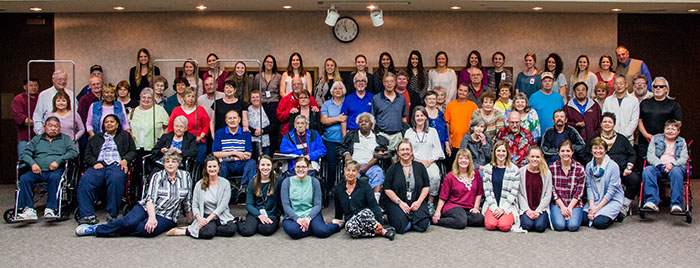Aphasia Recovery Program Heals and Builds a Community

Melinda Corwin, Ph.D., professor and director for the Texas Tech University Health Sciences Center School of Health Professions Stroke/Aphasia Recovery (STAR) Program has been working in speech pathology for years. She says aphasia is challenging for those who have survived a stroke or traumatic brain injury.
“It typically happens with damage to the left side of the brain and manifests differently
in every survivor,” Corwin said. “Strokes often are the cause of aphasia, but can
also be brought on by a primary progressive aphasia (PPA) such as dementia. Aphasia
is a loss of language that can manifest as difficulty reading, writing, speaking and
understanding words or numbers.”
The STAR program focuses on creating a community for stroke survivors, their caregivers
(family members and friends), speech-language pathology graduate students and faculty
members to build communication skills.
“We have 10 small groups and every group has a personality of its own,” Melinda Corwin,
Ph.D., professor and director for the STAR Program said. “They may have difficulty
speaking, but when they are given the personalized tools to communicate, their lives
improve drastically. We now have groups whose members sustained damage to the right
side of their brain, which controls tone and rhythm of voice, in addition to groups
whose members sustained damage to the left side of the brain which affects speech
and language. Every person needs personalized care. No two cases are alike.”
At the STAR end-of-year luncheon, awards were given to outstanding community members
for their support of people with communication challenges.
“We must all treat others in kind,” Pastor Mark Porter, a recipient of the Life Participation
community award, said. “They may have difficulty expressing their ideas, but their
mind is still there, all their skills are still there. They can still do accounting
and they can still tell jokes and stories. Life can be difficult for those with aphasia,
but with a strong community, they can truly thrive.”
This year, another special group added to the STAR Program includes members with Primary
Progressive Aphasia (PPA), a special type of aphasia caused by a progressive disease.
Logan Chandler, a first-year speech pathology graduate student, works with this group
called Pilgrim’s Progress.
“They are so supportive of each other,” Chandler said. “They will help each other
by trying to complete thoughts and are patient listeners. One person in our group
has great difficulty speaking, but when we play music, she can sing every word. We
can provide strategies to help maintain their communication abilities for as long
as possible.”
Another group within the STAR Program, Stroke of Genius, is facilitated by first-year
speech pathology student Brooke Hannemann.
“Strokes on the right side of the brain can cause a monotone voice and issues with
speech rhythm,” Hannemann said. “Most of our members return to work, and we help them
make phone calls, leave emails and ask questions with vocal inflection. We work on
their emphasis with musical trivia. They love music, especially classic rock. The
STAR Program brings people together and creates a community. Each individual has their
own goals and obstacles, but they are united in lifting each other up and improving
their lives.”
First-year graduate student Taylor Felan works with Minds of the Round Table, a mostly
nonverbal group. Minds of the Round Table has been a part of the STAR Program for
19 years. At their end-of-year luncheon, they put their developed skills into action
as they presented the cake.
“If you stepped into the room, you may not notice at first they have aphasia,” Felan
said. “They are always laughing and joking around. They’ve known each other for so
long, which has helped them build confidence and relationships. I like tailoring their
individual care to meet their personal needs.”
The STAR Program concluded their activities for the Spring 2017 semester, but will
begin its Fall 2017 meetings in September. Contact Corwin at 806-743-9050 for more
information on the STAR Program.
Related Stories
How Does Your Garden Grow?
As spring approaches, some people’s thoughts turn to gardening. Whether it’s a flower garden they desire or a vegetable garden want to have, they begin planning what they’ll plant and what they need to do to ensure a successful garden.
Adopt a Growth Mindset for a Better Life
A “growth mindset” accepts that our intelligence and talents can develop over time, and a person with that mindset understands that intelligence and talents can improve through effort and learning.
Drug Use, Family History Can Lead to Heart Disease in Younger Adults
Abstaining from drug abuse and an early diagnosis of familial hypercholesterolemia (high cholesterol) can help prevent heart disease.
Recent Stories
School of Pharmacy Remembers Contributions of Key Collaborator
Cynthia Nash, Pharm.D., served as an Adjunct Assistant Professor of Pharmacy Practice for the School, and was an instrumental collaborator and key ally in our partnership with the Dallas VA North Texas Health Care System.
Texas Tech University Health Sciences Center Expert Elected 2024–2025 American Pharmacists Association House of Delegates Speaker-Elect
The American Pharmacists Association (APhA) announced that Mary S. Klein, Pharm.D., was elected the 2024–2025 speaker-elect of the APhA House of Delegates.
Free Clinic Offered for Women’s Health Day
The Free Clinic, staffed by TTUHSC School of Medicine students, will host Women’s Health Day Clinic from 10 a.m. to 1 p.m. on April 27.
